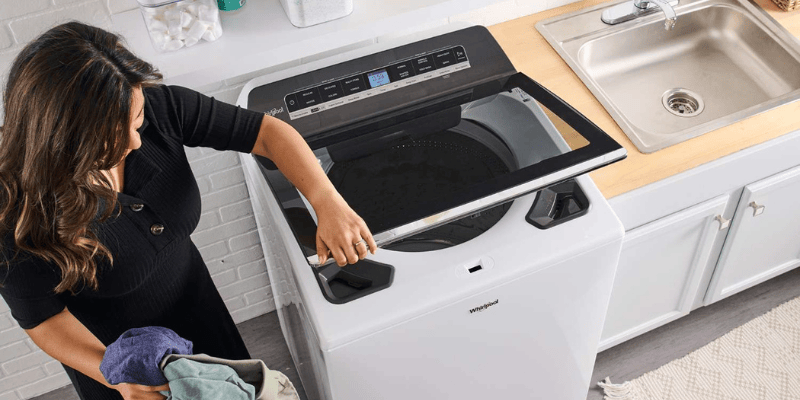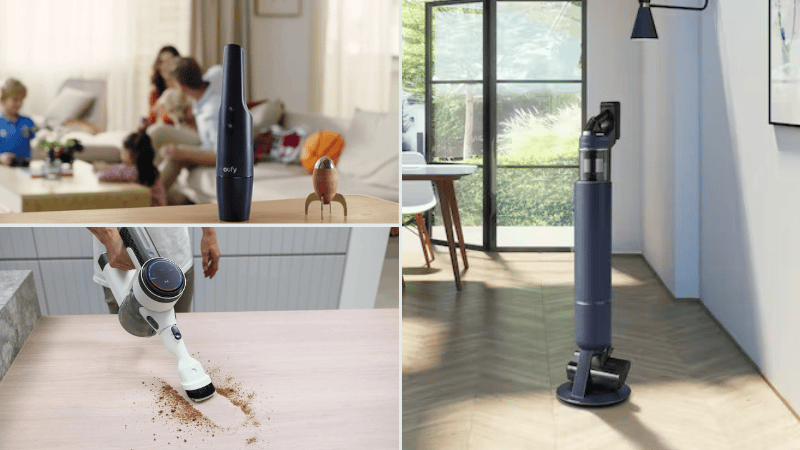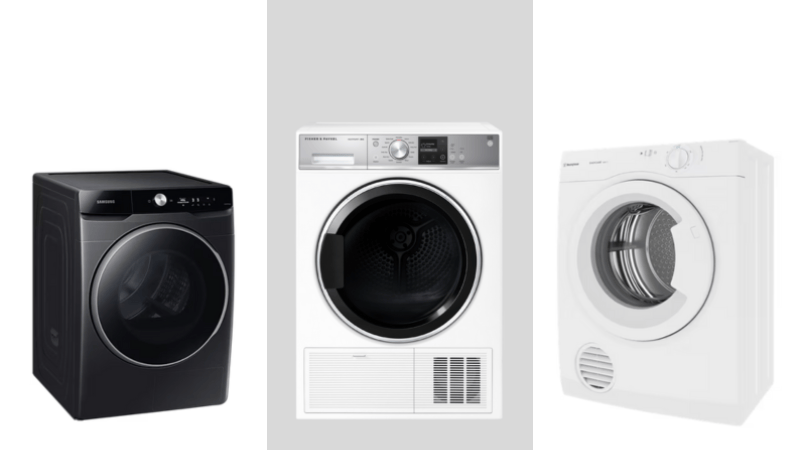From the early days of hand-cranked machines to the high-tech and energy-efficient devices available now, washing machines have become essential to every household. Today, choosing the best for your needs not only relies on the machine's efficiency, but you must also decide between a top loader and a front loader washing machine.
But what are the trade-offs between the two types? Which is more efficient, and which is the more durable option? In this article, we'll discuss the benefits and drawbacks of top-loader and front-loader washing machines. Let’s get started.
What are Top Loader Washing Machines?

Top loader washing machines are designed with a vertical drum mounted in the centre of the machine. Clothes are loaded into the machine from the top of the drum, and an agitator is responsible for moving the clothes around during the wash cycle. Top loader washing machines can be either fully automatic or semi-automatic. The former is more popular due to its convenience.
One of the main advantages of top-loader washing machines is that they are typically less expensive than front-loaders. They are also easier to load and unload clothes, making them an excellent choice for people with difficulty bending or reaching below. Additionally, they are less likely to have mould or mildew buildup, a common issue with front loaders.
What are Front Loader Washing Machines?

Front loader washing machines are a relatively newer type of washing machine that has recently gained popularity. They are designed with a horizontal drum mounted at the machine's front. Clothes are loaded into the machine from the front of the drum, and the machine uses a tumbling action to clean the clothes.
One of the major pros of front loader washing machines is they are more energy efficient than top loaders. They use less water and less energy during the wash cycle, which can result in lower water and electricity bills. Additionally, front-loader washing machines are typically more effective at cleaning clothes than top loaders, thanks to their tumbling action.
Top Loader Washing Machines: Pros & Cons
Being the cheaper option of the two is not the only advantage of a Top Loader washing machine. Here are all the pros and cons to make your decision easier.
Pros
Here are five reasons why the top loader washing machine is worth it:
- Easy to load and unload clothes: Top loaders are designed to be more user-friendly when loading and unloading clothes. You don’t need to bend over as much to load and unload clothes, which makes it easier on your back and ideal for older folks.
- Mostly less expensive than front loaders: Top loaders are generally cheaper, which can be a significant factor when budgeting for a new washing machine on a limited budget.
- Less prone to mould or mildew buildup: Top loaders are less likely to have mould or mildew buildup since they don’t have door seals like front loaders. Thus, leftover moisture can just easily evaporate through the unsealed top door.
- Easy to add more clothes: As these machines have top openings, it is easy to add further clothes even during the machine cycle. This is particularly convenient and time-saving.
- Lightweight to move around: Unlike front-load washing machines, which require heavier components, top-load machines use a simpler drum and motor that is mounted vertically. This allows for lighter overall weight without compromising on performance or durability.
Cons
For drawbacks, here are three reasons why a top-loader washing machine may not be worth it.
- Not as energy efficient as front loaders: Top loaders use more water and energy than front loaders, which can add up to a higher electricity bill in the long run. This somewhat negates their lower price since you may spend more down the road.
- Not effective at cleaning clothes as front loaders: Top loaders don’t use as much water or spin as fast as front loaders. This makes them less effective at cleaning clothes.
- Tend to use more water: Top loaders are also not water-efficient; they use more water than front loaders, which can be a concern if you live in areas with water restrictions or want to reduce your water usage.
Front Loader Washing Machines: Pros & Cons
Like top loaders, front loaders also offer specific benefits and drawbacks. We'll discuss them one by one.
Pros
Here are five reasons to buy a front-loading washing machine.
- More energy efficient: Front loaders are generally more energy efficient as they use less water and spin faster. This means they use less electricity in the long run, leading to savings on electricity bills.
- Effective cleaning power: Front-loading washing machines have a tumbling action that lifts clothes and drops them back into the water. The clothes get a longer soak time in the detergent and water mixture, making it easier to penetrate and remove dirt and stains.
- Less water consumption: Front-loaders use less water than top loaders, which can be a significant factor if you are concerned about reducing your water usage. This also contributes to the washing machine's efficiency and effectiveness.
- Additional washing cycles: Front loaders offer more wash cycles ideal for washing different types of clothes. Note, however, that this isn't the case across all front loaders. We recommend researching and comparing the features of different models to find the one that best suits your needs.
- Easier to reach: Depending on your height, front loaders may also be the more easily accessible option.
Cons
Here are three reasons why a front-loading washing machine may not be ideal.
- More expensive choice: Front loaders generally fall into the expensive category of washing machines compared to top loaders. However, they make up for this by being more energy and water efficient than top loaders.
- Tend to have mould or mildew buildup: Front loaders have a door seal that can trap moisture, leading to mould or mildew buildup if not cleaned regularly. Here's how to clean your washing machine effectively.
- Difficulty loading and unloading clothes: Front-loaders require you to bend down to load and unload clothes, which can be challenging for older folks or have mobility or back problems.
Which Type of Machine is Right for You?
When choosing between a top loader and a front loader washing machine, there are several factors to consider. Go over these carefully to decide which option best suits your needs.
#1. Consider your budget
When considering which type of washing machine to purchase, it's essential to consider your budget. If you are on a tight budget, a top loader may be your better option. Generally, top loaders are less expensive than front loaders, making them a more affordable choice.
Top loaders also tend to have fewer features than front loaders, which can be a pro or a con, depending on your preferences. Plus, they are less efficient with water and energy, which can accumulate the cost of use in the future.
#2. Consider the size of your laundry room
Another essential factor to consider is the size of your laundry room. If you have a small laundry room, a front loader may be the better option as they can be stacked, which saves space. Top loaders, on the other hand, require more floor space, making them less space-efficient. Thus, a front loader is a smart choice if you are working with a small area.
#3. Consider your energy efficiency preferences
Energy efficiency is an essential factor when choosing a washing machine. A front loader is ideal if you're concerned about your electricity bills or want to reduce your environmental impact.
Front loaders are generally more energy efficient than top loaders, meaning they use less energy to operate. This results in lower energy bills over time and a smaller carbon footprint. The same is true for their use of water.
#4. Consider your cleaning preferences.
Cleaning preferences should also factor into your decision. Choose a front loader if you have heavily soiled clothes or a large family. Front loaders are more effective at cleaning clothes due to their tumble wash action and, most often, can handle larger loads than top loaders. Plus, front loaders tend to be gentler on clothes, so if you have delicate fabrics, a front loader may be the smart choice.
Top Loader vs. Front Loader: Comparison Table
Still can't decide which option best fits your needs or that of your family, the simple table should help you easily compare the two washing machine types.
| Top Loader Washer | Front Loader Washer | |
|---|---|---|
| Loading and Unloading | Easier | More difficult |
| Energy Efficiency | Less efficient | More efficient |
| Water Efficiency | Uses more water | Uses less water |
| Cleaning Performance | Less effective | More effective |
| Mould/Mildew Buildup | Less likely | Likely if not cleaned properly |
| Cost | Typically less expensive | Typically more expensive |
Frequently Asked Questions (FAQs)
Here are some frequently asked questions about top-loader and front-loader washing machines.
Which type of washing machine is more durable?
Front loader washing machines have a longer lifespan than top loaders. This is because front loaders use less water and have a drum that rotates horizontally, which means less wear and tear on the machine components. Additionally, front loaders do not have agitators, which can cause damage to clothes and the machine over time.
Which type of washing machine is more energy efficient?
The front loader washing machine is a winner in terms of energy efficiency compared to a top loader washing machine. Front-loaders use less water and energy to clean clothes and have faster spin speeds, which means that clothes come out drier and require less time in the dryer. This results in additional energy savings.
Which type of washing machine is better for cleaning clothes?
Front loader washing machines are generally more effective at cleaning clothes than top loaders. The reason is that front loaders use a tumbling action to lift and drop clothes into the water, which provides a more thorough and gentle cleaning.
Is it true that top loaders use more water than front loaders?
Yes, top loaders tend to use more water than front loaders. Top loaders use a vertical drum that fills with water to cover the clothes. The process requires more water than front loaders, which use a horizontal drum.
Should I choose a top or front loader based on the size of my laundry room?
The size of your laundry room should not necessarily be the sole factor in choosing between a top loader or a front loader. Instead, consider the amount of space you have available for loading and unloading clothes.
Top loaders typically have a larger opening on the top, making it easier to load and unload clothes. But if your washing space is severely limited, a front loader may be a better choice as it can be stacked with a dryer, saving valuable floor space.
How often should I clean my washing machine?
You should clean your washing machine at least once a month to prevent mould and mildew buildup. You can do it by running a cycle with hot water and a cup of vinegar or using a washing machine cleaner to remove buildup and odours.
When cleaning, it is important to wipe down the door seal and drum after each use and leave the door open after each wash to allow for air circulation and drying. Regular cleaning and maintenance extend the lifespan of your washing machine and ensure that it continues to function effectively.
Bottom Line
In most cases, the front loader is the ideal and smarter choice between the two options. However, the decision comes down to personal preference and your individual needs. Both types of machines have pros and cons, and it’s essential to consider these factors before purchasing.
Choose a top loader washing machine if you expect a budget-friendly option with decent features. Otherwise, choose a front loader for its water and energy efficiency.
If you are now ready to research further, check out our guides to the best washing machines in Australia or, for our Kiwi readers, the best washing machines available in New Zealand.







